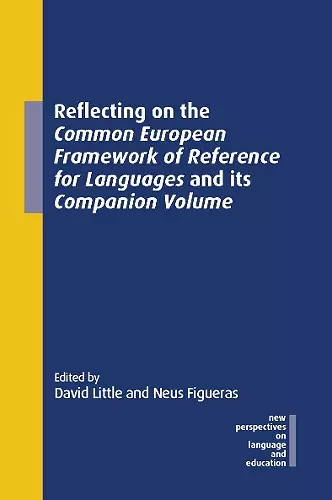Reflecting on the Common European Framework of Reference for Languages and its Companion Volume
David Little editor Neus Figueras editor
Format:Paperback
Publisher:Multilingual Matters
Published:2nd Mar '22
Should be back in stock very soon
This paperback is available in another edition too:
- Hardback£114.95(9781800410190)

The first book to focus on the Companion Volume from the broader perspective of the CEFR
This book discusses the impact of the Common European Framework of Reference for Languages and its Companion Volume on curricula, teaching/learning and assessment in a wide range of educational contexts, identifies challenges posed by the Companion Volume and sheds light on areas that require further research and development.
The Common European Framework of Reference for Languages (CEFR) and its Companion Volume have established themselves as an indispensable reference point for all aspects of second and foreign language education. This book discusses the impact of the CEFR on curricula, teaching/learning and assessment in a wide range of educational contexts, identifies challenges posed by the Companion Volume and sheds light on areas that require further research and development. Particular attention is paid to three features of the two documents: their action-oriented approach, their focus on plurilingualism, and the potential of their scales and descriptors to support the alignment of curricula, teaching/learning and assessment. The book suggests a way forward for future engagement with the CEFR, taking account of new developments in applied linguistics and related disciplines.
The authors of the different chapters are experienced users of the CEFR who provide a wide range of contrasting and complementary perspectives. Their contributions demonstrate the open, dynamic nature of the reference instrument, and while the book adopts a positive approach to the CEFR and the CV, the authors also point to issues that require further work. This publication is a timely reminder of the challenges in implementing plurilingual and intercultural education and the further potential of the CEFR and CV in that regard. * Joe Sheils, formerly Head of the Language Policy Division, Council of Europe *
This edited volume provides a useful account of the application of the key concepts discussed in the CEFR, such as emphasis on the role of the learner as an active user of the language, rather than a passive receiver of language instruction, plurilingualism, and mediation. The chapters in this book can help educators explore the full potential of the application of the CEFR in their own language teaching and assessment contexts. * Spiros Papageorgiou, Educational Testing Service *
The scope and depth of this timely volume are impressive, and every researcher working with some aspect of the CEFR will find at least a few chapters to be of direct relevance. The richness of this book extends to the range of viewpoints that are given a forum. The editorial decision to leave room for contrasting viewpoints allows for a substantive discussion of the benefits and drawbacks of the CEFR and its Companion Volume. * Bart Deygers, Ghent University, Belgium *
ISBN: 9781800410183
Dimensions: 234mm x 156mm x 12mm
Weight: 320g
232 pages